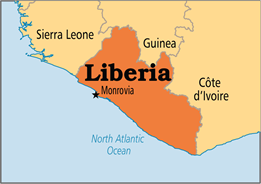AUGUST 13- TODAY’S READING FROM THE ONE YEAR BIBLE- Nehemiah 5:14- 7:60; 1 Corinthians 8:1-13; PSALMS 33:1-11; PROVERBS 21:8-10
TODAY’S READING FROM THE OLD TESTAMENT- Nehemiah 5:14- 7:60
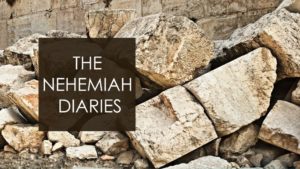 Nehemiah led by example. Although he was appointed as governor by the Persian King Artaxerxes, he did not take advantage of his executive privileges, such as the royal food allotment. Nor did he collect funds from the people for his personal support. He did not lord it over the people. His was an example of consecrated servant leadership. He never asked others to make a commitment that he himself was not willing to make.
Nehemiah led by example. Although he was appointed as governor by the Persian King Artaxerxes, he did not take advantage of his executive privileges, such as the royal food allotment. Nor did he collect funds from the people for his personal support. He did not lord it over the people. His was an example of consecrated servant leadership. He never asked others to make a commitment that he himself was not willing to make.
Nehemiah’s behavior is contrasted with others who had executive privileges. What made the difference? Nehemiah explains:
Nehemiah 5:15 15 But the former governors who were before me laid burdens on the people and took from them bread and wine besides forty shekels of silver; even their servants domineered the people. But I did not do so because of the fear of God.
How do you use your power of influence? Do you provide an example of whole-hearted commitment to the goal?
Nehemiah 5:16 16 I also applied myself to the work on this wall; we did not buy any land, and all my servants were gathered there for the work.
As leader, he worked with his fellow servants.
He shared what he had with others. 150 Jews and officials ate at his table. He did what would be best for the morale of the team. He continues to resort to the Lord in prayer, asking that He be given favor in his relationships with the people (5:19).
Sanballat, like the enemy of our souls, was relentless in his efforts to bring harm to the work. He asked Nehemiah to come down off the wall and meet him in one of the villages on the plain of Ono (6:1-2).
 Nehemiah had a proper estimation of his God-given calling. Even when it may not look like much, we must see the work that God has called us to as being a ‘great work’.
Nehemiah had a proper estimation of his God-given calling. Even when it may not look like much, we must see the work that God has called us to as being a ‘great work’.
Nehemiah 6:3 3 So I sent messengers to them, saying, “I am doing a great work and I cannot come down. Why should the work stop while I leave it and come down to you?”
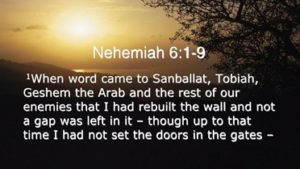 Four times the messengers of Sanballat came with this invitation, and four times Nehemiah gave them the same answer.
Four times the messengers of Sanballat came with this invitation, and four times Nehemiah gave them the same answer.
On the fifth attempt, Sanballat resorts to slander. His messenger brings an accompanying letter accusing Nehemiah of selfish motives and threatening to let the Emperor know that Nehemiah is planning a revolt and has appointed prophets who will proclaim him as king in Judah!
 Nehemiah protests their lies while at the same time praying to be strengthened to continue the work (6:9).
Nehemiah protests their lies while at the same time praying to be strengthened to continue the work (6:9).
What a great example of one who presses on even in the face of difficulties, discouragements and personal attacks.
Tobiah and Sanballat hired Shemiah to intimidate Nehemiah with news of a planned attempt on his life. They attempted to lure Nehemiah into a trap that would cause him to violate God’s commands regarding the temple. A false prophetess named, Noadiah, and others, tried to intimidate him. Nehemiah correctly discerns that these were plans of the enemy.
LANDMARK OCCASION
Nehemiah 6:15 15 So the wall was completed on the twenty-fifth of the month Elul, in fifty-two days.
Even Nehemiah’s enemies had to admit that this remarkable achievement had to be the work of God.
In Chapter 7, Gatekeepers, Levites, and singers are appointed.
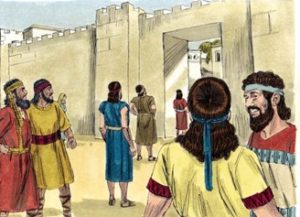 Gates and gatekeepers were vital to the security of the city. The city needed to be protected from those who might enter or leave the city to do harm. The city council would meet at the gates, and shopkeepers would set up their businesses by the entrances to the city. City gates would open after sunrise and close at sunset.
Gates and gatekeepers were vital to the security of the city. The city needed to be protected from those who might enter or leave the city to do harm. The city council would meet at the gates, and shopkeepers would set up their businesses by the entrances to the city. City gates would open after sunrise and close at sunset.
Although the wall was built and the city secured, there were still few who lived in the city and few houses had been built. Nehemiah saw the need to repopulate the city, but he needed to ensure that those who lived there were descendants of Israel with land rights in Judah. He examined the genealogical records (most likely the same one that Ezra found in Ezra Chapter 2).
TODAY’S READING FROM THE NEW TESTAMENT – 1 Corinthians 8:1-13
 In Chapter 8, Paul deals with the problem of eating meat that had been sacrificed to idols. Many of the Corinthians had been delivered from their former participation in occult practices which involved making sacrifices of thousands of animals to idols in the pagan temples. Part of the meat would be sold to the nearby markets and offered at a cheaper price that would make the purchase reasonable. However, partaking of meat that had been used for this purpose violated the consciences of some of their members. They recognized how demonic their false worship had been and did not want anything remotely associated with it.
In Chapter 8, Paul deals with the problem of eating meat that had been sacrificed to idols. Many of the Corinthians had been delivered from their former participation in occult practices which involved making sacrifices of thousands of animals to idols in the pagan temples. Part of the meat would be sold to the nearby markets and offered at a cheaper price that would make the purchase reasonable. However, partaking of meat that had been used for this purpose violated the consciences of some of their members. They recognized how demonic their false worship had been and did not want anything remotely associated with it.
By God’s grace, the Corinthian Christians had embraced the work of the cross and concluded their past. They signaled this fact with their public profession of faith in baptism. It is understandable that they wanted nothing more to do with their old life. But that was not easy to do in Corinth. The local meat markets often got its supply from the animal carcasses offered at the temple of idols.
 Because Christians in Corinth recognized that there is no other God but the Triune God of the Scriptures, many thought it should be no problem to purchase meat regardless of where it came from. Others knew the importance of holiness and desired to steer clear of anything associated with idol worship.
Because Christians in Corinth recognized that there is no other God but the Triune God of the Scriptures, many thought it should be no problem to purchase meat regardless of where it came from. Others knew the importance of holiness and desired to steer clear of anything associated with idol worship.
The danger was that those with strong convictions that all idol worship is counterfeit, and that meat is just meat and that all things are lawful were proud and insensitive in the way they dealt with this issue. Their bold disregard for those with a more sensitive conscience about eating meat that had been sacrificed to idols brought division and offense. Those with weaker consciences felt defiled when they ate meat from the Corinthian markets, knowing it had been used for dark purposes.
Paul explains that the sin is not in eating the meat; it is in being insensitive and unloving towards others. It would be sinful to knowingly offend a brother’s conscience when that offense could be avoided.
 When you sin against your brother by wounding their conscience, you sin against Christ.
When you sin against your brother by wounding their conscience, you sin against Christ.
Notice Paul’s resolve to bring his liberty and knowledge into check out of a loving regard for his brothers and sisters in Christ:
1 Corinthians 8:13 13 Therefore, if food causes my brother to stumble, I will never eat meat again, so that I will not cause my brother to stumble.
TODAY’S READING FROM THE BOOK OF PSALMS – PSALMS 33:1-11
 Psalm 33 begins with a call to joyful, symphonic (literally, sounding together), musical praise to God. He calls us to sing of our fresh appreciation of Who God is. Sing to the Lord a new song and shout for joy!
Psalm 33 begins with a call to joyful, symphonic (literally, sounding together), musical praise to God. He calls us to sing of our fresh appreciation of Who God is. Sing to the Lord a new song and shout for joy!
In verses 4 through 7, he gives reasons why we should honor the Lord with exuberant praise and worship. His Word is right and true. His character is holy, faithful and full of unfailing love. He acts according to His righteousness and justice.
He demonstrates His power in creation and His dominion over all the peoples of the earth.
His purposes will not be thwarted, despite the works of those who oppose Him.
Psalm 33:10-11 10 The LORD nullifies the counsel of the nations; He frustrates the plans of the peoples. 11 The counsel of the LORD stands forever, The plans of His heart from generation to generation.
TODAY’S READING FROM THE BOOK OF PROVERBS – PROVERBS 21:8-10
Proverbs 21:8-10 8 The way of a guilty man is crooked, but as for the pure, his conduct is upright. 9 It is better to live in a corner of a roof Than in a house shared with a contentious woman. 10 The soul of the wicked desires evil; His neighbor finds no favor in his eyes.
The first proverb reminds us that our conduct in attitude, speech and deed gives evidence of our essential character, disclosing whether we are reliable or a scoundrel.
Verse 9 reminds us to be careful to recognize the essential character of a person before choosing a spouse. Youthful appearances are fleeting. Character traits are not. Being married to a contentious person is regrettable and could make you want to camp out on the roof rather than face their irritability.
Verse 10 also teaches us to be careful to discern properly a person’s character. You are not likely to find empathy, understanding, or thoughtfulness coming from a person who is selfish and fully given to their own evil desires.
PRAY FOR THE NATIONS – LIBERIA
Republic of Liberia
Africa
Geography
Area: 99,067 sq. km
Heavily forested coastal state adjoining Sierra Leone, Guinea and Côte d’Ivoire.
Population: 4,101,767 Annual Growth: 4.23%
Capital: Monrovia
Urbanites: 61.5%
HDI Rank: 169 of 182 (UN Human Development Reports 2009)
Peoples
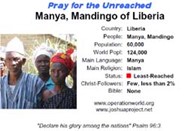 Peoples: 40 (10% unreached) All peoples
Peoples: 40 (10% unreached) All peoples
Unreached Peoples Prayer Card
Official language: English Languages: 31 All languages
Religion
Largest Religion: Ethnoreligionist
|
Religion |
|
Pop % |
Ann Gr |
|
1,699,362 |
41.43 |
4.9 |
|
|
600,533 |
14.6 |
4.6 |
|
|
Ethnoreligionist |
1,743,251 |
42.50 |
|
Challenges for Prayer
The task of evangelization and mission must fall to Liberians and other Africans. Foreign missionaries had a long, hard, uphill struggle to plant churches in the interior; but disease, language diversity, entrenched fetishism, and the disruption of war all hampered the work and eventually drove out all ex-pat workers. Few have returned. Pray for those with a burden to return; pray for wisdom to know how they can best serve in rebuilding the nation, and best help the Liberian church complete the evangelization of every people. National mission leadership is making progress in missions advocacy among churches and in researching the nation’s current status in terms of evangelization.
Christian help ministries are essential in this land of great spiritual hunger, great spiritual needs, but few material resources:
a) Bible translation and distribution ministries were gravely disrupted. The Bible Society and Lutheran Bible Translators projects have recommenced; 12 projects are active, but another four languages have definite Bible translation needs. The completion in 2005 of the Bassa Bible (Liberia’s second-largest indigenous language) was a major achievement.
b) Christian literature. Many pastors and Christians have lost all they owned, and there is a great lack of Bibles, New Testaments and Christian literature, and few available bookstores.EHC continues nationwide literature distribution; recent focus was on the Mandingo people. Literacy is also a huge challenge in this country, where almost a whole generation never had a proper chance to learn to read.
c) The JESUS film has been viewed by the majority of the population and continues to have a converting impact on Muslims. It is available in 13 languages; six more are in production.
d) GRN audio recordings are being used in 67 languages and dialects. These are essential for low-literacy contexts and oral learners. GRN has a Liberian base from which it has conducted nationwide outreaches and distribution. This base is well positioned to produce many more Christian recordings for evangelism, discipleship and training.
e) Christian radio. SIM‘s Radio ELWA might still be Africa’s best-known station, despite being evacuated four times and destroyed twice during the wars. ELWA has been resurrected, with eight hours daily in English and with broadcasts in nine Liberian languages, and plans for three more. Other local stations include Worship FM and a station by the Christian Education Foundation of Liberia as well as a station planned by the AoG and United Methodist Church. Praise God for the message that goes out. Pray for the provision of funds for these ministries and for the production of excellent content that will both reach and bless the entire nation.
Praise God for peace and stability of recent years. Hundreds of thousands of refugees returned, a new president came to power (the former leader was exiled), the country began to rebuild, and Christian ministry began to thrive once again. Liberia has an atmosphere of hope and progress, despite the obvious challenges.
PRAYER: Lord, You reign supreme over all. The vastness of Your created universe, Your attention to the smallest details of our lives, and Your ability to overrule the plans of the nations inspire us to worship. It gives us great confidence to know that Your purposes will not be thwarted. You have rescued us by Your strong arm, and no one can pluck us out of Your hand. We trust Your character of perfect righteousness and impeccable justice and rejoice to know that You are also full of mercy and compassion. All of this has been shown to us in the person and work of Your Son, who loved us and gave Himself for us, in that while we were still sinners, He died for us. We ask that You continue Your redemptive work as You conform us to His image and make us useful in the work of building up the testimony of Your glory in all the earth. In Jesus’ Name. Amen.

